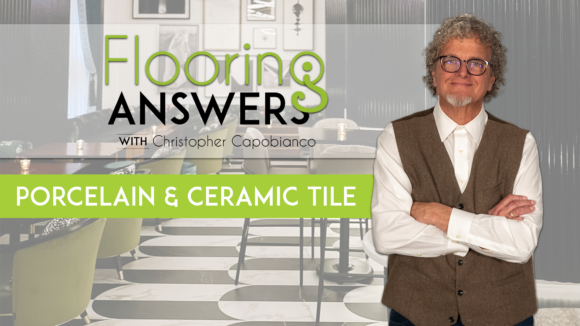Flooring Answers: Porcelain and Ceramic Tile

Offering both beauty and durability, porcelain and ceramic tile has proven itself not only as a stylish addition to public spaces but also as a logical choice for back of house, kitchens, and bathrooms. Its ease of maintenance and durability coupled with its aesthetic appeal makes the choice for tile easy, but with so many tile options on the market, it can be difficult to narrow it down from there.
Spartan Surfaces Christopher Capobianco shares insights on Porcelain and Ceramic tile specifications, standards, common mistakes, and maintenance in the latest article in our flooring answers series.
Standards for Tile Selection
Tile Council of North America (TCNA)
This organization establishes industry-wide standards for tile products and installation procedures.
Porcelain Enamel Institute (PEI) Rating
Measures the hardness of a tile’s glaze (surface). Use this rating to determine how well your chosen tile will stand up to foot traffic.
Mohs Hardness Scale
Rates the overall hardness of tile, with a scale of 0 to 10. For heavy-duty and commercial flooring, aim for a rating of 7 to 9.
Water Absorption
Critical for bathrooms, showers, and outdoor areas. Low-absorption tiles, usually porcelain, are recommended for these applications.
Porcelain vs. Ceramic Tile
Standards for Tile Selection
Both are considered ceramics, but there are distinctions:
Ceramic Tile
Made primarily from clay, ceramic tiles are less dense and more porous than porcelain, making them better suited for walls and low-traffic areas.
Porcelain Tile
Made with a mix of clay and quartz sand, providing superior hardness and durability. Porcelain tiles are an ideal choice for commercial uses and high-traffic areas of the home.
Common Specification Mistakes
When specifying rectangular tiles with a longer side exceeding 15 inches, TCNA recommends limiting the joint stagger to a maximum of 30% rather than the often-desired 50%. This helps minimize the risk of lippage (uneven edges) that can occur due to slight thickness variations in tiles.
Maintenance: Fact vs. Myth

While tile requires less maintenance than some flooring options, the belief that it requires no maintenance is a myth. Regular sweeping, cleaning, and careful grout selection are vital. Consider grout color in relation to traffic—light grout in heavy-traffic areas is prone to staining. Epoxy grouts are less porous and offer better cleanability.
Explore Our National Tile Lines
About Christopher
Christopher Capobianco covers the NY Metro and Connecticut area for Spartan. He’s a fourth-generation floor coverer whose family has been in the business since the 1930s. For 36 of the last 43 years, he’s had roles in retail, distributor, and manufacturer sales. The other seven years were spent in floor covering training and technical support. He also has been a part time columnist for various flooring magazines since 1988 and is a long-time member of the ASTM Committee on resilient flooring. You can reach him here.
Explore all our Flooring Answer Articles
Explore all our Flooring Answer Videos
About Spartan
Spartan Surfaces, a subsidiary of Floor & Decor, is a specialty flooring supplier headquartered in Bel Air, MD. Employing over 150 team members, Spartan holds warehousing and offices in Maryland and Minnesota with showrooms in D.C. and Chicago. Its geography encompasses eighty-five percent of the United States, with continued expansion on the horizon. Taking a human-centered approach, Spartan prides itself on great people dedicated to great products, great families, great friendships, and great happiness. Whatever you’re working on, we’ve got you covered!